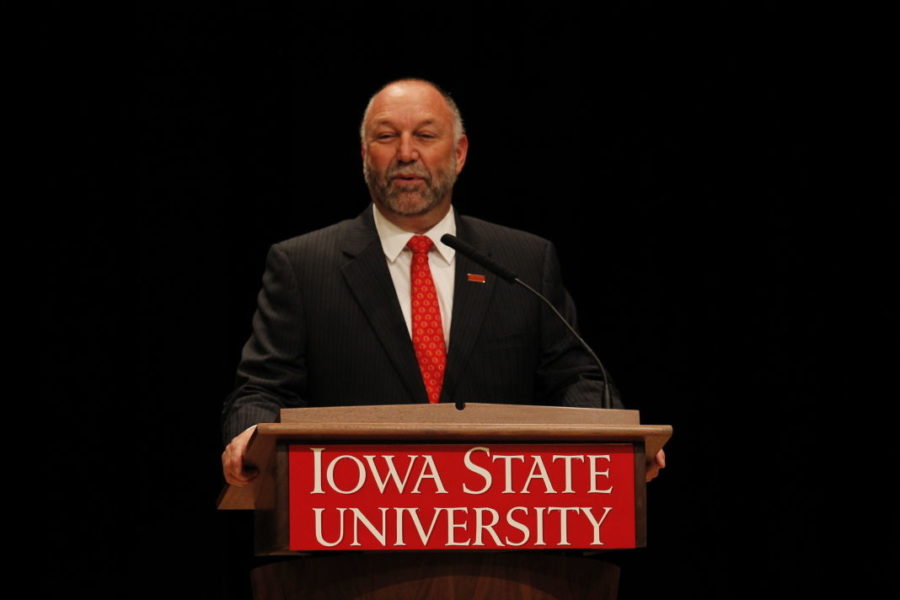Leath’s annual address focuses on expansion, accomplishments
September 15, 2014
ISU president Steven Leath said he wants to raise Iowa State to the next level.
Leath focused on quality faculty and staff, university accomplishments and expansion and plans to accommodate the increased enrollment at his annual address on Sept. 12.
The official fall 2014 enrollment is a record-breaking 34,732 students.
“I am thrilled that that many people want to come to Iowa State,” Leath said. “They come for the faculty primarily, who have a positive impact on these students.”
Leath spoke of a number of ways the university is expanding and how it plans to deal with the increased enrollment, including expanding academics, housing, dining and research.
Faculty
Leath announced in 2012 that he wanted to hire 200 additional faculty. Since then, 245 faculty have been hired. Leath said the faculty play a large part in the student experience at Iowa State.
“This place would not be the same without our dedicated staff,” Leath said. “It’s a great place to be and it’s a great place to be because of the people on this campus.”
The university now employs about 6,300 faculty and staff.
He also said the university is on track to hire about 100 new tenure track faculty again this year, making Iowa State one of the only universities in the country to hire 100 new tenure track faculty two years in a row.
Jonathan Wickert, senior vice president and provost, told members of the Faculty Senate he expects that $1.5 to $2 million has been set aside to fund new hiring this year.
“This will allow us to keep our student-faculty ratios where they need to be,” Leath said.
According to Leath, student to faculty ratios now are 19-1, with about 70 percent of classes having 29 or fewer students.
New academic and research spaces
Leath informed the audience that the new student innovation center, which would add lab space and provide students in the College of Engineering and the College of Design with hands-on experience, was approved by the Board of Regents last week. The project will cost $80 million and will be paid for evenly by private donations and state funds.
“It will not only add additional educational lab space online, but it will really promote our culture of student-driven innovation and experiential learning,” Leath said.
The new innovation center will be built where the Nuclear Engineering building and parking lot currently stand.
Sarah Rajala, dean of the College of Engineering, said students will be able to work with students in other disciplines to solve real world problems.
Leath also mentioned the fall 2014 semester opening of Sukup and Elings Halls, which house the agricultural and biosystems engineering program. The two buildings add 190,000 square feet of available research space, Leath said.
The Jeff and Deb Hansen Agricultural Learning Center opened in January, but it was dedicated Aug. 29. The $7 million building provides students in programs such as animal science the chance to practice more hands-on work with animals. It was funded entirely by private donations.
The Jeff and Deb Hansen Agricultural Learning Center includes classrooms, a conference room and a 125-foot-by-250-foot arena that seats 1,000 people.
Housing
The Department of Residence is housing a record number of students this year, Leath said. The university is housing an all-time high of 12,350 students and had to turn away about 220 students because they missed the application deadline.
“The community feel, the involvement opportunities, the convenience and a friendly staff makes students want to live in our facilities,” Leath said.
Off-campus apartment housing has doubled to about 1,100 beds, and 600 beds were added to Frederiksen Court this fall.
Over the last nine years, demand for housing has increased 42 percent while enrollment has increased 29 percent, Leath said at the September Board of Regents meeting.
A new 700-bed residence hall that is planned to go next to Buchanan Hall and that was approved by the Board of Regents in February is in the works to provide more student housing. A new dining center in Friley Hall is also in the works.
Leath also said the campus wireless is undergoing a “major overhaul” to accommodate the increased amount of students using the internet. The current system has 769 access points, while the replacement system will add an addition all 1,000 new access points in residence halls and Fredricksen Court.
Leath said that the university had a successful fundraising year, with more than $199 million raised in private funds.
“I am proud to be president of this university,” Leath said. “I will work hard to keep moving this university forward.”

















